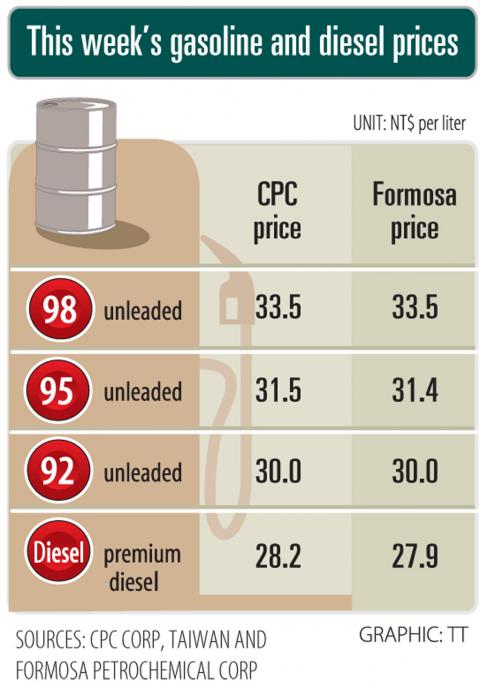CPC Corp, Taiwan (CPC, 台灣中油) yesterday said it would not raise gasoline and diesel prices again this year, despite rising international oil prices, to help keep domestic price levels stable.
The state-owned oil refiner normally adjusts its prices at the pump weekly depending on fluctuations in global crude oil markets.
Had it done the same this week, fuel prices would have reached their highest level since October 2014, the company said.

The company initially announced that it would increase prices by NT$0.5 per liter, even though they should have risen by NT$1.2 per liter based on its standard formula, and it would absorb the difference to help keep commodity prices in check.
However, at about noon, the company backtracked, and said it would cap prices at the current level until the end of this year.
It did not explain the sudden change of heart, other than to say it was worried about the impact of higher fuel prices on inflation.
However, CPC vice president Huang Jen-hung (黃仁弘) denied the move had anything to do with politics.
The decision came about seven weeks ahead of the nine-in-one elections on Nov. 24.
Domestic fuel prices have risen for seven weeks in a row after global crude prices soared 18.57 percent from US$70.61 per barrel on Aug. 20, CPC said.
Huang estimated it will cost the company an estimated NT$300 million (US$9.73 million) to absorb the full brunt of the fuel price hike for the coming week.
However, he said it would be difficult to estimate the cost of to the company of keeping the cap in place to the end of the year, because of the unpredictable nature of global oil prices.
Huang would only say that CPC hopes oil prices will remain stable in the short term to limit its losses.
Investors and analysts are beginning to anticipate the possibility that oil will hit US$100 a barrel during the peak winter demand period — which runs from late this year to early next year — the firm said.
Oil-producing countries and OPEC members see US$70 to US$80 per barrel as an ideal price range and could increase production to keep prices in that range, CPC said.
Privately run Formosa Petrochemical Corp (台塑石化) yesterday said it would also keep its fuel prices for this week unchanged in line with the government’s policy to help stabilize commodity prices.
However, it would have to evaluate whether it could maintain a price freeze to the end of the year, Formosa executive vice president Lin Keh-yen (林克彥) said.

OPTIMISTIC: The DGBAS sharply upgraded its GDP growth estimate from 3.54 percent to 7.71 percent after the Taiwan-US trade agreement signing and given AI optimism The US imported more from Taiwan than China for the first time in decades, as US President Donald Trump’s tariffs reshape trade flows while a global boom in artificial intelligence (AI) fuels demand for tech products. US purchases of goods from China plunged almost 44 percent in December last year from 2024 to US$21.1 billion, US Department of Commerce data showed on Thursday. By contrast, shipments from Taiwan more than doubled during the same period to US$24.7 billion. The soaring Taiwanese shipments to the US reflect the huge expansion in supplies of chips and servers for AI companies, which has completely changed

The Central Election Commission has amended election and recall regulations to require elected office candidates to provide proof that they have no Chinese citizenship, a Cabinet report said. The commission on Oct. 29 last year revised the Measures for the Permission of Family-based Residence, Long-term Residence and Settlement of People from the Mainland Area in the Taiwan Area (大陸地區人民在台灣地區依親居留長期居留或定居許可辦法), the Executive Yuan said in a report it submitted to the legislature for review. The revision requires Chinese citizens applying for permanent residency to submit notarial documents showing that they have lost their Chinese household record and have renounced — or have never

US and Chinese fighter jets briefly faced off above waters near the Korean Peninsula this week, Yonhap News agency reported, marking a rare confrontation in that area between the two superpowers. About 10 US fighter jets on Wednesday departed an airbase in Pyeongtaek, South Korea, for drills above international waters off South Korea’s western coast, the news outlet cited unidentified military sources as saying. While the US planes did not enter China’s air defense identification zone, Beijing scrambled planes as they neared that region, the report said. “The Chinese People’s Liberation Army organized naval and air forces to monitor and effectively respond

Taiwan has secured another breakthrough in fruit exports, with jujubes, dragon fruit and lychees approved for shipment to the EU, the Ministry of Agriculture said yesterday. The Animal and Plant Health Inspection Agency on Thursday received formal notification of the approval from the EU, the ministry said, adding that the decision was expected to expand Taiwanese fruit producers’ access to high-end European markets. Taiwan exported 126 tonnes of lychees last year, valued at US$1.48 million, with Japan accounting for 102 tonnes. Other export destinations included New Zealand, Hong Kong, the US and Australia, ministry data showed. Jujube exports totaled 103 tonnes, valued at